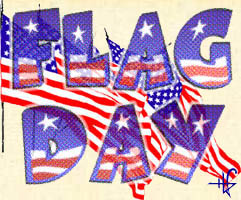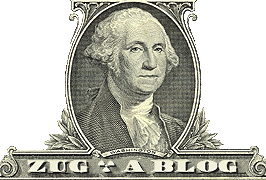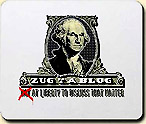Corporate Toilet Paper?

Today is that forgotten holiday, Flag Day.
Established by Woodrow Wilson, by proclamation in 1916, Congress enshrined "National Flag Day" in 1949.
On this day in 1777, the Congress adopted our flag (which has been modified over time). This is "Old Glory"s Two Hundred and Thirtieth (and no/100s) birthday.
As you may have noticed, it is our forgotten holiday -- even though we must constantly suffer the exaltation of a piece of cloth into a religious icon, trumping the First Amendment, according to Congress and the various state legislatures, who wear sackcloth and ashes, rend their garments and wail about flag burning.
Flag burning is such an uncommon crime that its very rarity generally kills "anti-flag burning" amendments and laws.
In Texas v. Johnson, the Supreme Court in 1989 managed to delineate the range of opinion -- from the sacredness of the flag to the secularity of a piece of cloth -- in two appendices: Justice Kennedy's concurrence, and William "Wild Bill" Rehnquist's dissent.
The Court held that flag burning was constitutionally protected free speech.
The great American jurist, Justice William Brennan wrote the majority decision.
Brennan himself is a great American story: a Catholic Democrat from New Jersey, known for his specialty, union busting, he was a RECESS appointment by President Eisenhower in 1956.
Freed from the need to serve his corporate masters, Brennan became the heart and soul of the Warren Court, the very antithesis of the sort of Justice that Eisenhower had attempted -- in that Imperial Presidency manner -- to slither past Congress. (Shades of John Bolton).
Wrote Brennan:
"Under the circumstances, Johnson's burning of the flag constituted expressive conduct, permitting him to invoke the First Amendment... Occurring as it did at the end of a demonstration coinciding with the Republican National Convention, the expressive, overtly political nature of the conduct was both intentional and overwhelmingly apparent." The court concluded that, while "the government generally has a freer hand in restricting expressive conduct than it has in restricting the written or spoken word," it may not "proscribe particular conduct because it has expressive elements."That was all very nice, but a point needed to be made. So, Justice Kennedy wrote in his concurrence:
I do not believe the Constitution gives us the right to rule as the dissenting Members of the Court urge, however painful this judgment is to announce. Though symbols often are what we ourselves make of them, the flag is constant in expressing beliefs Americans share, beliefs in law and peace and that freedom which sustains the human spirit. The case here today forces recognition of the costs to which those beliefs commit us. It is poignant but fundamental that the flag protects those who hold it in contempt.And, wrote Rehnquist in his (loony) dissent:
The American flag, then, throughout more than 200 years of our history, has come to be the visible symbol embodying our Nation. It does not represent the views of any particular political party, and it does not represent any particular political philosophy. The flag is not simply another "idea" or "point of view" competing for recognition in the marketplace of ideas. Millions and millions of Americans regard it with an almost mystical reverence regardless of what sort of social, political, or philosophical beliefs they may have. I cannot agree that the First Amendment invalidates the Act of Congress, and the laws of 48 of the 50 States, which make criminal the public burning of the flag.[Any reasonably intelligent high school civics student can refute the Cheap (sic) Justice, which is a sad commentary on the state of Constitutional law.]
This was the quotable portion. The remainder consisted of pages of maundering, flag waving, quoting poetry, doggerel and song lyrics, and generally making very little sense as an adult, but firmly establishing Rehnquist's reputation in my mind as a jingo of the first water. Wikipedia (and most legal writers) pass over the quintessential sophomoric smarminess of this classic piece of jurisprudential bullshit:
CHIEF JUSTICE REHNQUIST, with whom JUSTICE WHITE and JUSTICE O'CONNOR join, dissenting.And that's just the beginning.
In holding this Texas statute unconstitutional, the Court ignores Justice Holmes' familiar aphorism that "a page of history is worth a volume of logic." For more than 200 years, the American flag has occupied a unique position as the symbol of our Nation, a uniqueness that justifies a governmental prohibition against flag burning in the way respondent Johnson did here.
At the time of the American Revolution, the flag served to unify the Thirteen Colonies at home, while obtaining recognition of national sovereignty abroad. Ralph Waldo Emerson's "Concord Hymn" describes the first skirmishes of the Revolutionary War in these lines:
"By the rude bridge that arched the flood
Their flag to April's breeze unfurled,
Here once the embattled farmers stood
And fired the shot heard round the world."
Later, Wild Bill would show his reverence for the flag by aiding and abetting the theft of the 2000 Election in the insane decision (this is not a precedent, quoth the decision) in Bush v. Gore.
And this well represents the spectrum of American opinion on the flag, whose day this is. From worship to respect, we all honor the flag.
Some of us would just rather deify it.
So, while we're here, let's ask: if everybody loves the flag so much, and honors it, to the point of wanting to amend the Constitution to elevate it ABOVE the First Amendment, sanctifying a piece of cloth, then how come nobody ever says a WORD about all the flags displayed at McDonalds, at motels and hotels, and flown without ever illuminating the flag at night, without taking it down in rain, letting the flag wave until tattered and faded, and replaced with as little ceremony and attention as we replace a roll of toilet paper?
Isn't that at least as disrespectful as flag burning?
Moreso, since flag burning at least has a POINT. Flying the flag as a cynical decoration has no point, save to goose sales.
So, if you don't celebrate Flag Day -- like nearly all Americans -- at least take the day to notice how many abused flags you see, flapping insincerely in front of fast food joints, motels and car dealerships.
And ask yourself: is this how we honor the flag?
Here is the full text of Justice Kennedy's concurrence, in six brilliant, straightforward paragraphs:
JUSTICE KENNEDY, concurring.And so he did. The flag waves on, protecting us all. For now.
I write not to qualify the words JUSTICE BRENNAN chooses so well, for he says with power all that is necessary to explain our ruling. I join his opinion without reservation, but with a keen sense that this case, like others before us from time to time, exacts its personal toll. This prompts me to add to our pages these few remarks.
The case before us illustrates better than most that the judicial power is often difficult in its exercise. We cannot here ask another Branch to share responsibility, as when the argument is made that a statute is flawed or incomplete. For we are presented with a clear and simple statute to be judged against a pure command of the Constitution. The outcome can be laid at no door but ours.
The hard fact is that sometimes we must make decisions we do not like. We make them because they are right, right in the sense that the law and the Constitution, as we see them, compel the result. And so great is our commitment to the process that, except in the rare case, we do not pause to express distaste for the result, perhaps for fear of undermining a valued principle that dictates the decision. This is one of those rare cases.
Our colleagues in dissent advance powerful arguments why respondent may be convicted for his expression, reminding us that among those who will be dismayed by our holding will be some who have had the singular honor of carrying the flag in battle. And I agree that the flag holds a lonely place of honor in an age when absolutes are distrusted and simple truths are burdened by unneeded apologetics.
With all respect to those views, I do not believe the Constitution gives us the right to rule as the dissenting Members of the Court urge, however painful this judgment is to announce. Though symbols often are what we ourselves make of them, the flag is constant in expressing beliefs Americans share, beliefs in law and peace and that freedom which sustains the human spirit. The case here today forces recognition of the costs to which those beliefs commit us. It is poignant but fundamental that the flag protects those who hold it in contempt.
For all the record shows, this respondent was not a philosopher and perhaps did not even possess the ability to comprehend how repellent his statements must be to the Republic itself. But whether or not he could appreciate the enormity of the offense he gave, the fact remains that his acts were speech, in both the technical and the fundamental meaning of the Constitution. So I agree with the Court that he must go free.
Courage.










0 Comments:
Post a Comment
Links to this post:
Create a Link
<< Home